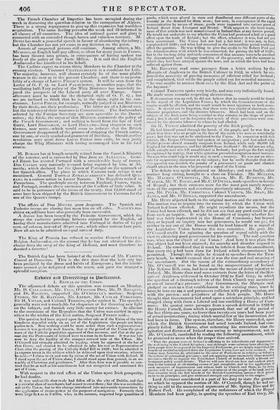The French Chamber of Deputies has been occupied during the•
week in discussing the question relative to the occupation of Algiers. There is a strong repugnance to give up this expensive but worthless acquisition. The same feeling pervades the weak and ill informed in all classes of all countries. The idea of national power anti glory is connected with an extended though barren and valueless territory. M. Duette has made a powerful speech in favour of abandoning the colony; but the Chamber has not yet come to any decision on the point. Arrests of suspected persons still continue. Among others, a Mr. blutesose an English half-pay officer, resident for many years in France, has been thrown into prison, in consequence of having spoken too freely of the policy of the Juste Milieu. It is said that the English Ambassador has interfered in his behalf.
The Curlists expect to return thirty Members to the Chamber at the ensuing election. Viscount ClIATEAUBRIAND is a candidate for Lille. The majority, however, will almost certainly be of the same pliable texture in the next as in the present Chamber; and there is no proba- bility of a change of LOUIS PHILIP'S system. It will be seen from the Letter of 0. P. Q. to Lord PALMERSTON, in another page, that the vacillating half-Tory policy of the Whig Ministers has materially in- jured the prospects of the Liberal party all over Europe. Seine allowance must be made for the rhetorical style of 0. 1'. Q. ; but we are inclined to think that he is, in the main, right in his con- clusions. LOUIS Penile for example, naturally judged of our Ministers by their deeds, not their professions. The latter are of a Liberal cast, but the tendency of their measures is Conservative. Tire Ambassadors selected by the Foreign Secretary are men agreeable to the Doctri- naires ; the Globe, the organ of that Minister, commends the policy of the French Government ; and nothing is heard from the lips of Earl GREY, Lord Barniettem, or Lord HOLLAND-101Ig eloquent on such themes, now mute—which would seem to indicate that the British Government disapproved of the process of stripping the French nation', vane by one, of every symbol and guarantee of freedom. Should another revolution once more drive Louis Pulley into exile, ire may justly ,charge the Whig Ministers with having encouraged him in his fatal course.


















 Previous page
Previous page